In the winter of 2012, a normally healthy Adele Gordon struggled to shake off a cough. Little did she know that this would lead to a journey of tests and misdiagnosis, eventually resulting in a shock cancer diagnosis and being told she would rely upon a bone marrow transplant to save her life.
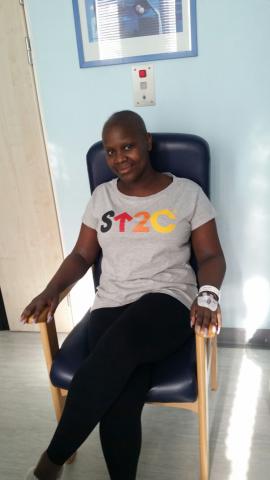
“I had a cough but it was winter so I just thought it was normal. I also had no energy but because I have a busy job I didn’t think much of being tired either.”
“After a while, I told my manager I needed some time off and a little break. I went to the doctors because the cough just wouldn’t go away and kept getting told it could be different things over a long period of time. Eventually they suggested that I have x-ray to check it out. That’s when I was told I had cancer.”
After nearly a year of misdiagnosis, Adele was diagnosed with Stage 2 Hodgkin’s Lymphoma in November 2013 at just 25 years old.
“It was a massive shock to me. I was a young person, I don’t smoke and I was just thinking – why me? I had no lumps or anything - it was just a cough.”
“We don’t have a family history of cancer and I didn’t know anything about it. The only knowledge I had was from TV. Ironically, I actually saw the ad about dry coughs being a sign of cancer when I diagnosed, but I would never have thought a dry cough would lead to a cancer diagnosis.”
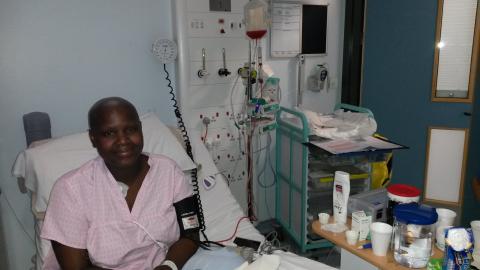
Adele in hospital
Adele then underwent several courses of chemotherapy, and after two cycles she was in remission but then relapsed and a further four cycles of treatment followed. It was at this point that Adele was told she needed a lifesaving bone marrow transplant.
“It was a very scary time, especially when you hear about the lack of African-Caribbean donors and the odds of finding that perfect match.”
Just a 20% chance of the best match for people with African Caribbean heritage
Adele is just one of 2,000 people in the UK who are told they need a bone marrow transplant each year. Two thirds cannot find a match within their own family and rely on blood cancer charity Anthony Nolan to find their donor. But because Adele is of African Caribbean heritage her odds of finding a match from a stranger would have been dramatically reduced.
Currently, because of a lack African Caribbean people on the register it means that, if you’re African Caribbean and in need of a bone marrow transplant, you have less than a 20% chance of finding the best possible match from an unrelated donor.
Adele’s sister Maryse and her brother were tested to see if they were a match for her. Luckily for Adele, Maryse came up as a perfect match defying the odds of there being only a 25% to 30% chance of having the same tissue type as a sibling.
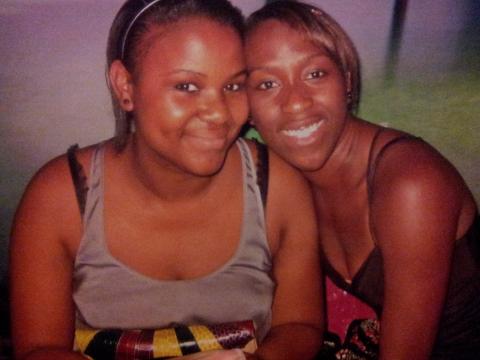
Adele and her sister Maryse
Maryse says, “When I was tested I didn’t really think much about it, it was just a case of let’s see what happens. At the time I didn’t really understand how the odds were against Adele in terms of finding a match, whether that was from within our family or from a stranger. Knowing now it’s obviously a relief that I was that perfect match.”
Maryse then donated her stem cells in December at the same hospital as her sister, via a simple method called Peripheral Blood Stem Cell Collection, which is a similar process to giving blood.
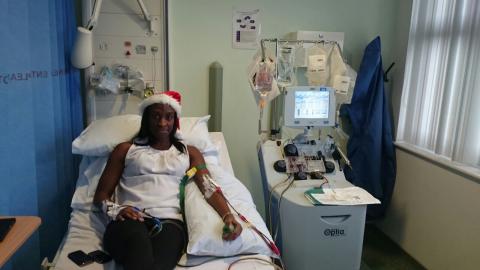
Maryse donating her stem cells for her sister Adele
“It’s not as painful as people think; so many refer to old outdated methods of retrieving bone marrow. It's very similar to giving blood but for a greater length of time - I actually ended up falling asleep which passed the time well! I was fully recovered about two days later.”
Maryse was then later by Adele’s bedside as she received her sister’s lifesaving stem cells.
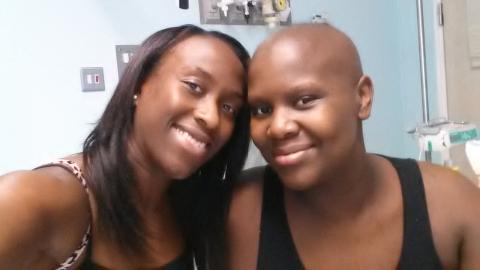
Maryse says, “I sat with Adele on the ward and the bag came in with all my stem cells which was weird! We had a laugh and joke about it saying stuff like – “Do you know what I’m thinking now?”
#BeingAfricanCaribbbean - join our lifesaving campaign
Adele and Maryse are now supporting a campaign by Anthony Nolan and the African Caribbean Leukaemia Trust (ACLT) called ‘Being African-Caribbean’, which aims to increase the numbers of African-Caribbean donors on the bone marrow register.
Adele says, “I would definitely say I was one of the lucky ones to have my sister being a match. I see online all the time that people struggling for a match and their story just stays up there as they wait, I just feel so sad for them.”
“It’s a real injustice because cancer doesn’t discriminate, no matter what age or colour you are. Because we are a minority we need to unite and make sure this doesn’t happen and fight it together. Together we are so much stronger.”
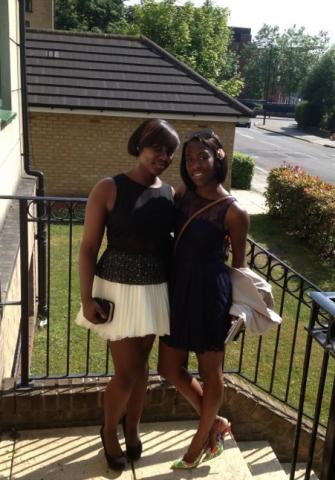
Ann O’Leary, Head of Register Development at Anthony Nolan, says, ‘As Adele says, she was fortunate her sister was a match. Without Maryse, Adele’s story could have been so different. It really highlights how much we rely on the remarkable people who join our register and pledge to save a life by donating their stem cells.
‘We need more selfless people to step forward as donors so that we can find matches for people in need of a transplant, especially those from African-Caribbean and other black and minority ethnic communities as they are underrepresented on the register. What many people don’t realise is just how simple it is to be a donor. Registering simply involves providing a saliva sample.’
'Now we need the next generation of young African-Caribbean people to sign up to the Anthony Nolan register today'
Beverley De-Gale, Co-Founder at ACLT says, ‘Like so many other families, we faced an agonising wait to find a matching donor for our son Daniel; the odds were stacked against us, as we were told that there were only 550 black people on the Anthony Nolan register at that time, despite years of campaigning.
At times we felt helpless, but we realised we could make a huge difference for Daniel and others like him if we addressed the lack of awareness head-on, so we set up the ACLT. The answer to this heart-breaking situation was in our own communities – and they truly did us, and Daniel, proud.’
‘Now we need the next generation of young African-Caribbean people to follow this example and sign up to the Anthony Nolan register today. If you’re 16 to 30, you could give people facing blood cancer future and end the inequality that black people face when searching for a donor.’
Find out more about ACLT on their website.
